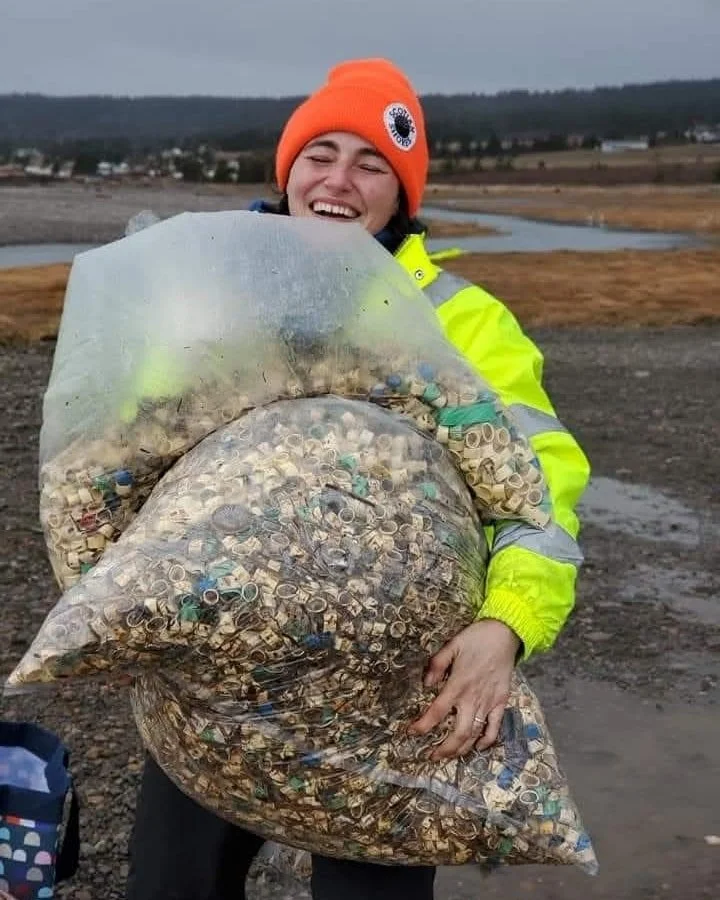Stepping up with (re)purpose
One impressive Nova Scotian shows the huge impact one person can make as she and fellow volunteers collect garbage from Nova Scotia shorelines — to the tune of a million and a half pounds since 2020 — giving much of it a second life.
Angela Riley and volunteer with bags of trash, ropes, and rigid plastics lined up behind them. Photo courtesy of Scotian Shores.
Angela Riley wanders through a scrubby field near a Nova Scotia shoreline, passing by industrial-strength white bags lining her path and stacked on a 50-foot transport trailer behind her. All are bulging at the seams and full of debris that has been sorted before heading to recycling facilities.
Riley, her hands in white work gloves, stops and rifles through one of the super sacks, rhyming off some of the contents that have been plucked from coastal areas throughout the province: plastic strapping, disposable coffee cups, water bottles, milk jugs, fish bins, bleach containers, fishing rope, tires, metal and motor oil containers.
The sizable haul is just a small part of the 150,000 pounds of waste she and dozens of volunteers have collected so far this year, marking a noteworthy milestone since she started her group five years ago as the pandemic set in.
Angela carrying bags of collected lobster elastics. Photo courtesy of Scotian Shores.
"Never in my wildest dreams did I think it would turn out to be what it is now," Riley says with a chuckle about Scotian Shores, the organization she founded from her home in Eastern Passage.
"For my health and for a lot of other people's health, we can say we're actually doing something and we're being positive about it and finding friendship through it. It's just formed into a community and a really big grassroots movement that I didn't realize was going to grow to the point it has!"
Washed up fishing gear rope. Photo courtesy of Scotian Shores.
What it has become in a short time is a fixture in shoreline cleanup efforts in the province after Riley, 38, found herself at home with two young children and little to do when the pandemic was declared in the winter of 2020. She had long had an attachment to the ocean, having grown up in a fishing family on the eastern shore and serving as a sea cadet, so says she would take her kids for walks at nearby beaches, often finding them littered with marine debris.
Being raised to believe that people should take care of their environment, she and her family started picking up the tires, lobster traps, glass, water bottles and fishing gear they would come across on their walks. The more she did it, the more Riley realized there was a need to organize regular outings to recover waste that would wash ashore day after day and didn't appear to be anyone's responsibility.
"Every time we went to this beach it was dirty, and I was like, 'I just cleaned this yesterday. What is going on?'" she says. "So, we kind of stepped in, and I said, 'I'll be responsible for it.'"
Clean-up crew standing in front of washed up and collected fishing buoys. Photo courtesy of Scotian Shores.
Riley started organizing beach cleanups with a marketing pitch she launched at a local market: buy a handmade bracelet and she would collect one pound of garbage. She sold out and has been hosting cleanup events ever since, attracting scores of volunteers who turn up to help out.
In 2020, the group collected 5,000 pounds of debris and the amounts have been rising steadily since then, with 1.6 million pounds being collected since Scotian Shores was created. Riley estimates that they collect more than 800 pounds of waste a day and have done about 775 cleanups so far.
They recycle between 60 to 90 per cent of the collected waste, with some of the plastic being shipped to a Nova Scotia company that can transform it into synthetic fuel. They also repurpose plastic and rope into key chains, jewelry, rope bowls, and other crafts that are sold online and at markets, with proceeds going toward more cleanups. Scotian Shores relies on grants, donations and merchandise sales to sustain its small group of team leads.
"Scotian Shores is a powerful example of what’s possible when community comes together for a shared purpose. What began as a small grassroots effort has grown into a province-wide movement, showing that collective action can make a real and lasting impact," says Kurt Laskow-Pooley, director of programs and development at Divert NS.
"Reducing litter and debris along our shorelines is critical to preserving the natural beauty of our province, protecting wildlife and keeping our communities clean and healthy."
244 Collected Baccaro Point lobster traps. Photo courtesy of Scotian Shores.
Climate Stories Atlantic is an initiative of Climate Focus, a non-profit organization dedicated to covering stories about community-driven climate solutions.
Sign up for notifications of our latest free articles. You can unsubscribe at any time.





